History of 100 Years
1925~1950
1951~1975
1976~2000
2001~2025
1925
大正14年
Establishment of Chugai Boeki
Established in January 1925 as Doi Utaro Shoten, the company was reorganized as an unlimited company and renamed Chugai Boeki Gomei Kaisha six months later on August 1. The name “Chugai (inside and outside)” was adopted as the company name to indicate that it was a trading company connecting Japan (inside=domestic) and overseas (outside=overseas) and continued to be used after the company was reorganized as a joint-stock company in 1935.
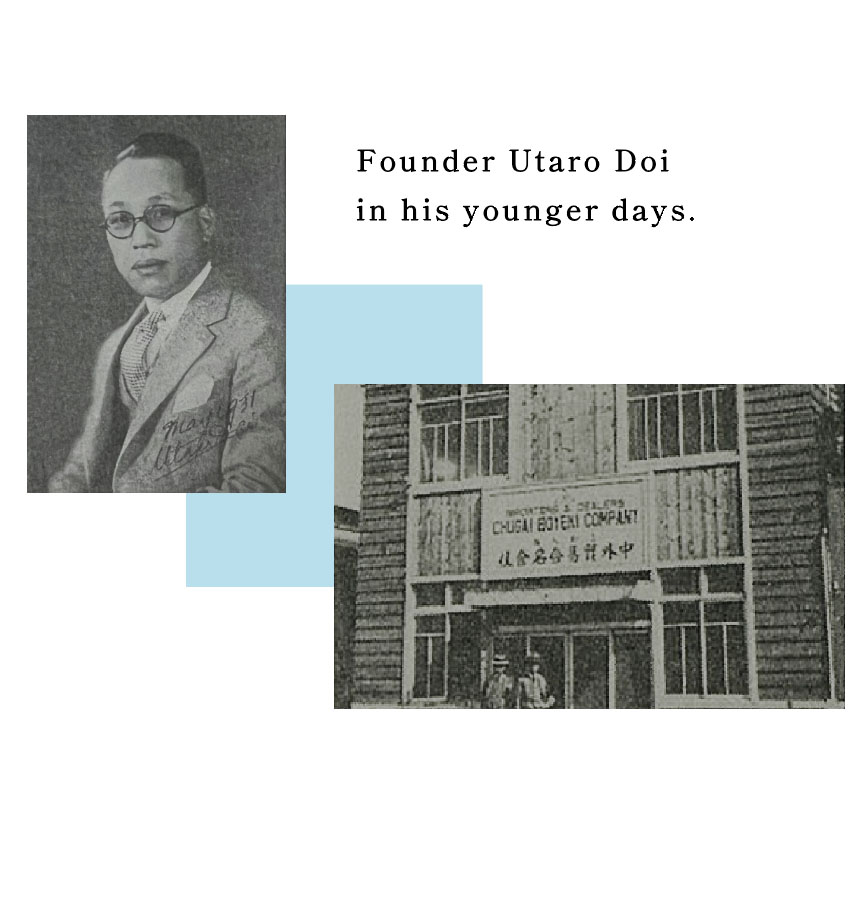
1936
昭和11年
Opening of Shanghai Branch
The Shanghai Branch was opened in 1936 to promote trade with China. While exporting chemicals, dyes, intermediates and miscellaneous goods from Japan, it also imported products such as grains and tea from China and sold them in Japan. In 1939, as business picked up steam, the branch was reorganized as a local subsidiary and renamed Showa Ryu Trading Company.
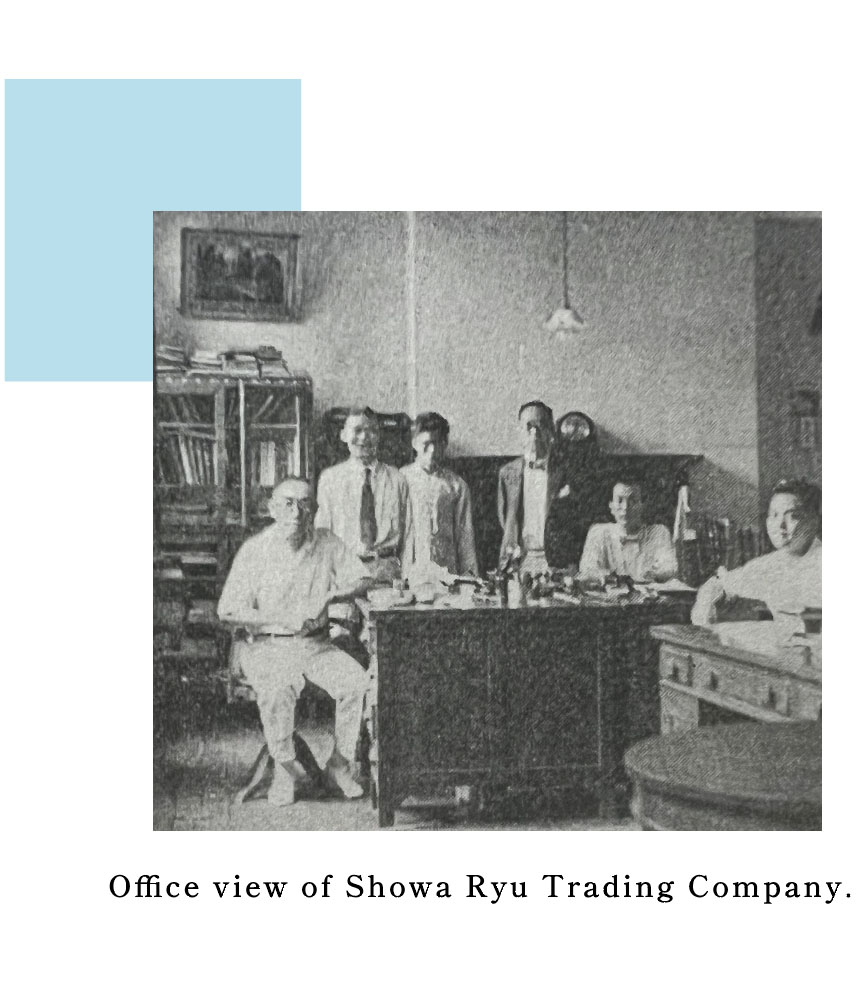
1946
昭和21年
Restart after the War
CBC made a new start in 1946, the year after the war ended. The “New Company Principles at Our Re-inauguration” announced to its employees at the time included the company’s contribution to corporate social responsibility and the peaceful prosperity of the world as well as its stance to ensure strict compliance and actively incorporate U.S. scientific management and highly efficient production systems. This fundamental principle, which foresaw the age of free competition and provided insight into the path CBC should take amidst Japan’s chaotic political and economic situation, remains the basis for CBC’s management and human resource development policies even today.

1954
昭和29年
Petrochemical Industry Drove Japan's Rapid Economic Growth
From 1954, CBC began to develop in earnest as the country entered a period of rapid economic growth. Around 1965, in addition to PVC, which CBC had traditionally handled, demand for polyethylene resin and synthetic rubber, which CBC had made an early effort to import and develop domestic sales channels for, grew significantly. CBC worked with the engineers of manufacturers to plan various materials and end products required by society and supplied them to the market. In particular, synthetic resins, which are resistant to water and chemicals, lightweight and can be mass-produced, transformed the lives of Japanese people. CBC also contributed greatly to the development of the petrochemical industry.
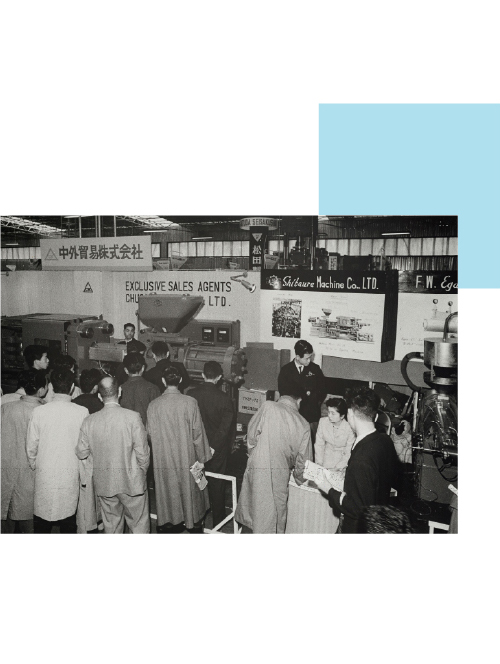
1960
昭和35年
Opening of New York Representative Office
The aim of entering the New York market was to develop a market for synthetic resin processed products, dyes and other chemical products, which had acquired international competitiveness, so that we could sell them in developed markets. In New York, we were able to contribute to the expansion of sales of domestically produced PVC and polyethylene films.

1974
昭和49年
Manufacturing of Optical Products
CBC’s first challenge in the area of manufacturing was followed by many failures, but the company continued to go through a process of trial and error and never gave up. This passion bore fruit in the form of lenses for surveillance cameras, and CBC launched its own brand, Computar, in 1981. Today, it has become a major pillar of CBC’s business together with the “GANZ” brand for surveillance cameras and peripheral equipment. It has grown to become the top brand in the global market, where the world's leading manufacturers are engaged in fierce competition.
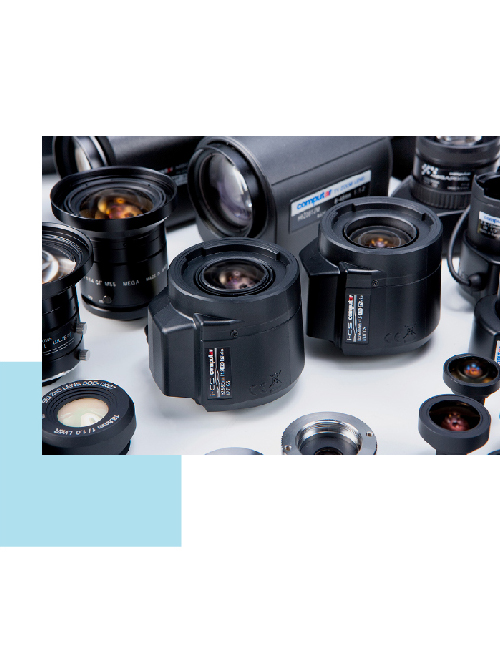
1983
昭和58年
We make “good taste” and “environmental friendliness” come true.
CBC, which fulfills both “good taste” and “environmental friendliness,” had foreseen the maturation of market needs for pesticide-free products since the early days when there was little awareness of “food safety” or “environmental issues,” and has been involved in agricultural business focusing on the environment and safety from an early stage. One of its most unique products is an insecticide which uses synthetic pheromones to disrupt the reproductive behavior of pests and prevents insect damage while maintaining the natural ecosystem. As a result of its long-lasting development based on its own perspective, CBC has succeeded in spreading environmentally friendly commercial products throughout the world. Even today, the company continues to expand its environmentally friendly business. Taking on the challenge of creating business with a determined attitude is indeed CBC's style.

1999
平成11年
Name Changed to CBC Co., Ltd.
Celebrating its 74th anniversary, Chugai Boeki was renamed and made a fresh start in the 21st century as CBC Co., Ltd. The logo mark, with its distinctive oval shape rising to the right, represents the universe of chemistry and at the same time shows the determination and momentum to reach its ultimate goal. We continue to strive for this even today with our insatiable spirit of exploration.
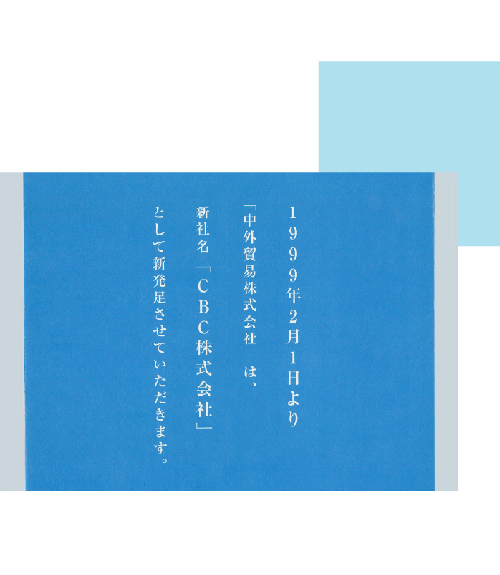
2002
平成14年
Approach to Environmental Business
In addition to pest control agents using synthetic pheromones, CBC has long been aiming to contribute to environmental issues, the most important challenge of the 21st century, through its business. CBC is also focusing on planning, developing and supplying materials related to solar cells, fuel cells and LED lighting as businesses that reduce the burden on the environment. CBC obtained ISO 14001 certification in 2002 and continues to work actively to contribute to preventing global warming and creating a society capable of sustainable development.
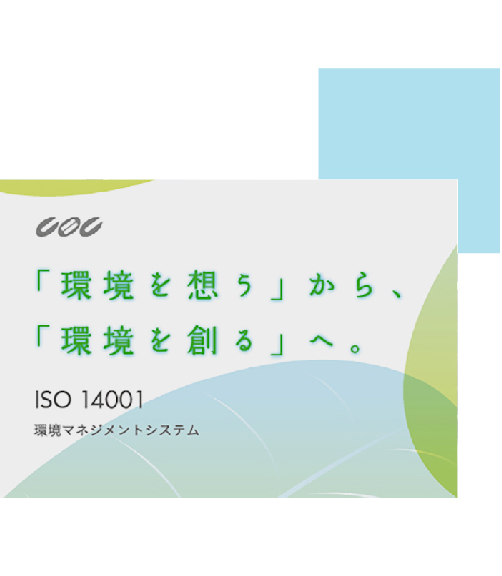
2005
平成17年
CBC INGS Company
CBC INGS Company, which was established for the purpose of molding and painting computer housings, expanded its operation bases to China in 2002, Thailand in 2008 and the United States in 2014. While capturing the growth market for mobile phones, digital cameras and smartphone components, the company expanded into component manufacturing in anticipation of the major growth of the automotive industry in East Asia and Southeast Asia, which continues to this day. In 2005, the Mishima Plant was completed as a base for disseminating information to overseas plants, contributing greatly to technological innovation and productivity improvement.
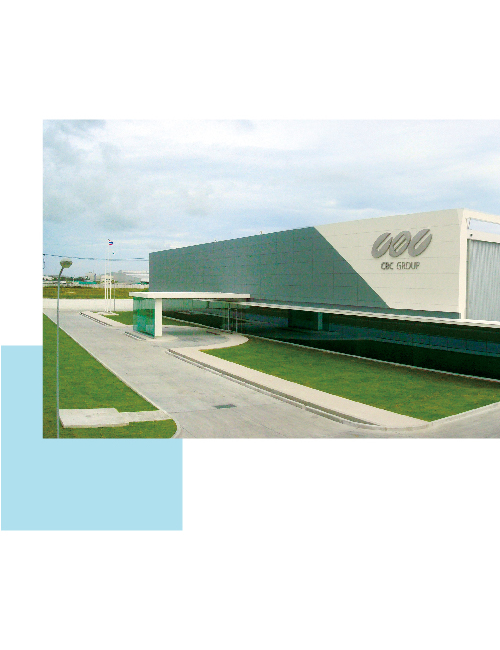
2006
平成18年
Acquisition of Procos
The aging of society is now a common issue not only in Japan but also in the world including developed countries. In response to this issue, the pharmaceutical market, which helps maintain and improve the health of the elderly, is growing. CBC also entered the pharmaceutical industry from an early stage. In 2006, CBC acquired Procos, an Italian pharmaceutical intermediate manufacturer, in order to play a central role in this industry. Procos is fulfilling its mission to contribute to the health of as many people as possible while building synergies with CBC’s extensive network.
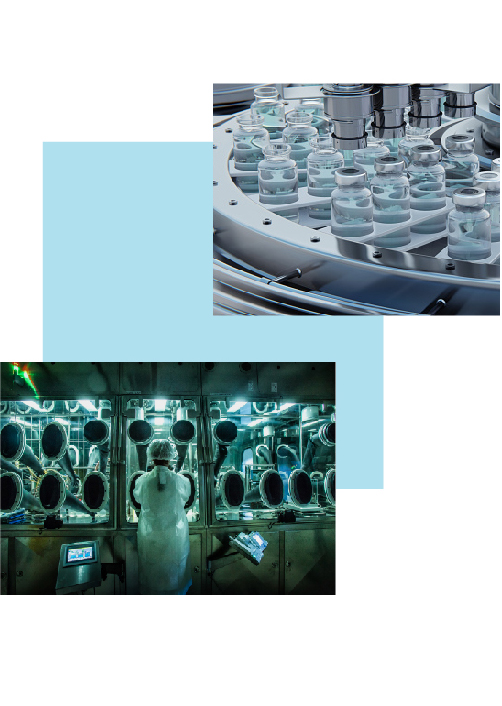
2012
平成24年
Acquisition of Intrachem Bio Italia Spa
In 2012, CBC acquired Intrachem Bio Italia Spa, an Italian company that comprehensively handles materials for agricultural practice known as IPM (Integrated Pest Management) such as biopesticides and specialized fertilizers. Its biopesticides have attracted widespread attention, as they prevent the growth of other bacteria by attaching and multiplying microorganisms, which are completely harmless to grapes, to the leaves. By combining these environmentally friendly formulations and fertilizers, the company aims to reduce the use of chemical pesticides, support pesticide residue-free agriculture and further expand the scope of environmentally friendly business that is also friendly to producers and consumers.
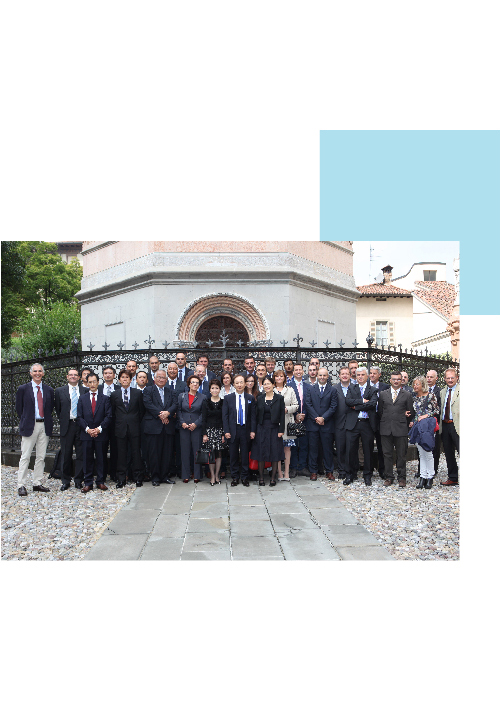
2017
平成29年
Grande Ufficiale Award
On October 13, 2017, more than 40 years after launching its full-fledged global operations, Utaro Doi, CBC's President (current Chairman), was awarded the Grande Ufficiale Award, the highest order given to foreigners in recognition of their contribution to Italy's economic development and job creation. CBC, which has bases around the world, promotes diversity to maximize the use of human resources with diverse cultural backgrounds and values, and continues to take on new challenges and grow in a way that is appropriate for the global age.
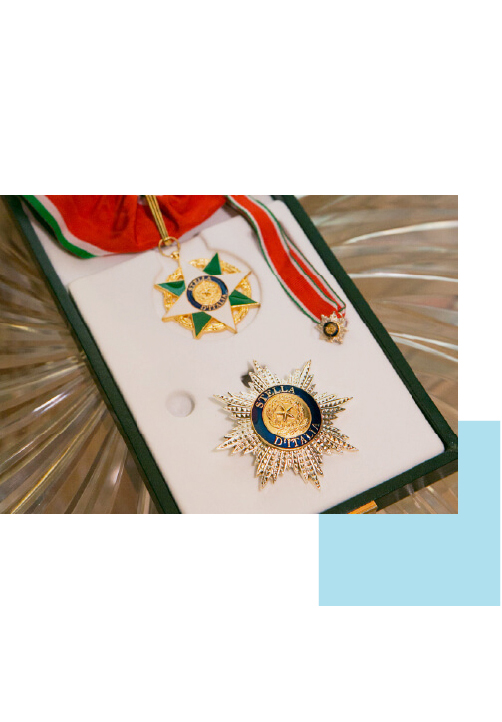
2025
令和7年
100th anniversary of the company's founding





